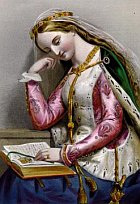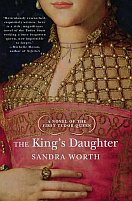Medieval
Fiction
|
|
|
|

Elizabeth
of York
|

Elizabeth
Woodville,
Elizabeth's
mother
|

Lady
Margaret Beaufort, mother of Henry VII
|
|
Medieval
Book Reviews !
All
Things Medieval !
|
|
The King's
Daughter:
a Novel of the First Tudor Queen

by
Sandra Worth
Capitivity and Power Plays, Kingship
and motherhood
Elizabeth of York, loyal daughter
to King Edward IV, worships her father and believes in him as king.
While her mother plots and schemes, her father reaches her with his
ideas and warmth. When he dies, Elizabeth encounters Richard, Duke of
Gloucester, the man appointed as regent for Edward's son. Despite the
wicked rumors about Richard and the multiple misfortunes her family
experiences throughout his rise to power, Elizabeth knows her father
entrusted the kingdom into his hands. Was he wrong? One night,
Richard's wife Anne speaks to her from the heart and Elizabeth comes to
know better the man, as king as and father, and indeed herself. As
political pressures come to bear, making her a pawn in a power play for
the kingship, his presence in her heart helps her to endure the horrors
ahead and devote her life to serving England as wife to Henry Tudor
(Henry VII).
In the absence of letters or personal documents from Elizabeth of York
herself, Sandra Worth's first person narrative creates an insightful
portrait of her as a woman and mother during turbulent times as the
Middle Ages come to a close and a new era is born when Elizabeth
becomes the first Tudor queen. Sandra Worth makes the connections
between all the royal figures throughout these shifts of power so that
readers feel the intrigue and danger among the uneasy alliances. THE KING'S DAUGHTER gives a
chilling insight into the heart of the monarchy where family alliances
provide solace but also create a threat to one's very existence as
grabs for position within the family destroy. A brother is not just a
brother but also a man who stands in the way of access to power. Within
this context, the contrast between Elizabeth and her mother, and later
Elizabeth of York and Lady Margaret Beaufort (mother to Henry VII)
highlight the precarious position of women in this world as well.
Sandra Worth provides an intriguing look not only into the limited role
of women during this era but also a look into which the wield power of
their own and the determination choices royal women make, albeit in
ways perhaps less obvious to the casual observer.
THE KING'S DAUGHTER
brings several key characters to life so that historical figures
sometimes presented as isolated characters in history books are now
seen in their relationships to one another, thus giving this period a
new vibrancy and depth. THE KING'S
DAUGHTER focuses on Elizabeth as a woman in her roles as
daughter, lover, wife and mother. Sandra Worth views this period
through family dynamics and love first and foremost, juxtaposing the
sometimes brutal machinations of power of those surrounding Elizabeth
to her longings and devotion to family. Living her life in one sort of
captivity or another most of her life, some more obvious, such as her
time of escape to to sanctuary, than others, such as her being under
the almost absolute control of her mother-in-law, Elizabeth of York was
a quiet woman with a rich inner life. Elizabeth thought, read and
internalized omens and the great works of medieval literature from
Boethius, the Tristan tale to Sir Thomas Malory's Arthurian tales.
Although the dating of Boethius is off a couple of centuries (an
editing typo hopefully but an important correction not to miss), Sandra
Worth does an exceptional job not only in her selection of relevant
medieval works, but also in her use of them in Elizabeth's thoughts to
give a depth to her character and to the period itself. As the new
world emerges, slight hints of that change enter in references to
Erasmus and a chilling reference to Machiavelli's THE PRINCE. Through literature, the
reader comes to know Elizabeth's values and her intimate thoughts on
love and kingship. Though sometimes Elizabeth appears frustratingly
submissive, Sandra Worth's contrast to the careful and covetous
plotting of others shows growing determination within her to make a
difference, a determination that in the end makes her true to the name
"Elizabeth the Good" often bestowed upon her. As the novel progresses,
Elizabeth of York moves from being a woman mostly ruled by others to a
woman looking outward, not only as a mother trying to look out for her
children, but also a woman determined to serve her people. Sandra Worth
leaves readers with a haunting, disturbing image of the future Henry
VIII. THE KING'S DAUGHTER
will appeal to a wide variety of historical fiction readers, not only
for the presentation of a world in the process of change but also
Sandra Worth's ability to capture the the inner lives of her characters.
Publisher: Berkley (December
2008)
|
Book description
Seventeen-year-old
Elizabeth of York trusts that her beloved father’s dying wish has left
England in the hands of a just and deserving ruler. But upon the rise
of Richard of Gloucester, Elizabeth’s family experiences one
devastation after another: her late father is exposed as a bigamist,
she and her siblings are branded bastards, and her brothers are taken
into the new king’s custody, then reportedly killed.
But one fateful night leads Elizabeth to question her prejudices.
Through the eyes of Richard’s ailing queen she sees a man worthy of
respect and undying adoration. His dedication to his people inspires a
forbidden love and ultimately gives her the courage to accept her
destiny, marry Henry Tudor, and become Queen. While her soul may
secretly belong to another, her heart belongs to England…
|
|

|